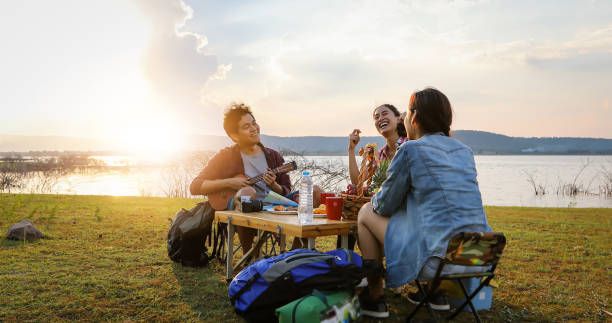Mindful Travel: Tips For Mindful and Intentional Travel

Travel is a wonderful way to broaden one's perspective, learn about different cultures, and create lasting memories. Whether it's exploring a new city, relaxing on a beach, or trekking through a remote wilderness, travel has the ability to bring people out of their comfort zones and provide new experiences.
One of the best things about travel is the opportunity to learn about different cultures and ways of life. By visiting a new place, travelers can immerse themselves in the local culture, learn about the history and customs of the area, and gain a deeper understanding and appreciation for the world around them. This can lead to personal growth and a greater appreciation for diversity and inclusivity.
Travel can also be a chance to break out of a routine and experience something new and exciting. Trying new foods, exploring unfamiliar terrain, and meeting new people can be invigorating and energizing.
It can also be an opportunity to challenge oneself and overcome fears, such as trying an extreme sport or navigating a foreign city.
Another benefit of travel is the ability to disconnect from the stresses of everyday life. By getting away from the familiar surroundings and obligations of daily life, travelers can unwind and recharge, and return home feeling refreshed and rejuvenated.

However, it's important to keep in mind that travel also has its challenges and potential negative impacts. Over-tourism can lead to strain on local resources and infrastructure, while irresponsible tourism can lead to exploitation and damage to local ecosystems and cultures. Additionally, travel can be expensive, inaccessible, and environmentally damaging.
To mitigate these negative impacts, travelers can practice responsible and sustainable tourism. This includes supporting local businesses and economies, minimizing waste and environmental impact, and respecting local customs and cultures.
It's also important to prioritize safety while traveling, taking necessary precautions such as researching the destination and staying aware of potential risks.
Travel is a wonderful opportunity to learn about the world, challenge oneself, and experience new and exciting things. However, it's important to approach travel mindfully and responsibly, taking into account the potential impacts on both the traveler and the destination.
By practicing sustainable and responsible tourism, travelers can create positive impact, both for themselves and for the places they visit.
Defining mindful travel

Mindful travel is a type of travel that emphasizes being present and fully engaged in the travel experience, while also being conscious of the impact that travel can have on the environment, local communities, and oneself. It involves a thoughtful and intentional approach to travel, where the focus is on quality rather than quantity.
Mindful travel involves being fully present in the moment, observing and appreciating the sights, sounds, and experiences of the destination.
It means letting go of distractions such as social media and technology, and taking time to reflect on the travel experience. Mindful travel encourages travelers to slow down, be more observant, and take the time to savor the experiences they are having.
In addition, mindful travel involves a commitment to sustainability and responsible tourism. This means making conscious choices that minimize the negative impact of travel on the environment, local cultures, and economies.

It also involves being respectful of the local community, and engaging in ethical and sustainable travel practices such as supporting local businesses, reducing waste, and minimizing carbon footprint.
Overall, mindful travel is about being fully present and engaged in the travel experience, while also being conscious of the impact of travel on oneself and the world around us.
It encourages travelers to take a thoughtful and intentional approach to travel, and to seek out meaningful and authentic experiences that benefit both the traveler and the destination.
Preparing for mindful travel

Preparing for mindful travel requires taking a thoughtful and intentional approach to planning, packing, and engaging in the travel experience. Here are some tips for preparing for mindful travel:
1. Research the destination: Before traveling to a new destination, take time to research the local culture, customs, and environment. Learn about the history and traditions of the area, and understand the potential impacts of tourism on the local community and environment.
2. Plan a sustainable itinerary: When planning your itinerary, seek out sustainable and responsible tourism options. Choose eco-friendly accommodations, support local businesses and communities, and opt for experiences that minimize negative impact on the environment.
3. Pack mindfully: Pack light and choose sustainable travel gear such as reusable water bottles, eco-friendly toiletries, and cloth bags. Consider the impact of your packing choices on the environment, and choose items that can be easily reused or recycled.
4. Be present and engaged: While traveling, be fully present and engaged in the experience. Take time to appreciate the sights, sounds, and experiences of the destination, and let go of distractions such as social media and technology.
5. Respect the local culture: Be respectful of the local culture and customs, and engage in ethical and responsible travel practices such as supporting local businesses, minimizing waste, and being mindful of your impact on the environment.
6. Connect with the local community: Engage with the local community and learn from their experiences and traditions. This can help foster mutual understanding and respect, and create a more meaningful and authentic travel experience.
By preparing for mindful travel, travelers can create a more sustainable and responsible travel experience, while also gaining a deeper understanding and appreciation of the destination and its culture.
Traveling sustainably

Traveling sustainably is an important aspect of mindful travel, as it allows travelers to minimize their impact on the environment and local communities while still enjoying the travel experience. Here are some tips for traveling sustainably:
1. Choose sustainable transportation: Opt for sustainable modes of transportation such as biking, walking, or using public transportation when possible. If flying is necessary, choose direct flights and economy class seating, as these options typically have a lower carbon footprint.
2. Reduce waste: Minimize waste by bringing a reusable water bottle, cloth bags, and reusable containers for snacks and meals. Avoid using single-use plastics such as straws and plastic bags.
3. Support local businesses: Support local businesses and communities by choosing locally owned accommodations, restaurants, and shops. This not only helps to support the local economy, but also allows travelers to experience the culture and traditions of the destination.
4. Respect the environment: Respect the environment by choosing eco-friendly activities such as hiking, snorkeling, or kayaking, and avoiding activities that may harm the environment such as animal tourism.
5. Reduce energy consumption: Reduce energy consumption by turning off lights and air conditioning when not in use, and limiting the use of electronic devices.
6. Leave no trace: Leave no trace by packing out all trash and not disturbing natural habitats or cultural sites. Follow designated trails and respect wildlife and local customs.
By traveling sustainably, travelers can minimize their impact on the environment and local communities, and contribute to a more responsible and ethical tourism industry. This not only benefits the destinations being visited, but also helps to create a more meaningful and authentic travel experience for the traveler.
Engaging with local communities

Engaging with local communities is a key aspect of mindful travel, as it allows travelers to learn about the local culture, traditions, and way of life. Here are some tips for engaging with local communities while traveling:
1. Respect local customs and traditions: Take the time to learn about local customs and traditions before engaging with the local community, and respect their way of life. Be open-minded and willing to learn, and avoid imposing your own beliefs or values on others.
2. Learn the local language: Learning a few basic phrases in the local language can go a long way in building rapport and showing respect to the local community. It can also help to facilitate communication and create a more meaningful exchange.
3. Support local businesses: Choose locally owned accommodations, restaurants, and shops, and support the local economy. This not only helps to create a more authentic travel experience, but also contributes to the local community and economy.
4. Participate in cultural activities: Participate in cultural activities such as cooking classes, music performances, or local festivals. This can help to deepen your understanding and appreciation of the local culture and traditions.
5. Volunteer with a local organization: Volunteering with a local organization can be a great way to give back to the community, learn new skills, and make a meaningful impact. Look for organizations that align with your values and interests, and be mindful of your impact on the local community.
6. Be open and curious: Be open and curious when engaging with the local community, and seek out opportunities to learn and connect with others. Show genuine interest and respect, and be willing to step outside of your comfort zone to have a more authentic travel experience.
By engaging with local communities, travelers can gain a deeper understanding and appreciation of the local culture, and contribute to a more sustainable and responsible tourism industry. This not only benefits the local community, but also creates a more meaningful and authentic travel experience for the traveler.
Disconnecting from technology

Disconnecting from technology is an important aspect of mindful travel, as it allows travelers to fully immerse themselves in the travel experience and connect with the destination on a deeper level. Here are some tips for disconnecting from technology while traveling:
1. Set boundaries: Set boundaries for technology use, such as limiting social media or email checks to certain times of the day, or setting a specific time to turn off electronic devices.
2. Use technology mindfully: Use technology mindfully by choosing apps and websites that enhance the travel experience, such as language learning apps or travel guides. Avoid mindless scrolling or excessive use of technology that can detract from the travel experience.
3. Go off the grid: Choose accommodations or destinations that do not have Wi-Fi or cell service, and use this as an opportunity to disconnect and fully immerse yourself in the travel experience.
4. Connect with nature: Spend time in nature and engage in outdoor activities such as hiking, kayaking, or camping. This can help to reduce stress and promote relaxation, while also allowing travelers to connect with the natural environment.
5. Engage in cultural activities: Participate in cultural activities such as cooking classes or traditional crafts, and use this as an opportunity to connect with the local community and learn about the local culture.
6. Be present: Practice mindfulness and be fully present in the travel experience. Put away electronic devices and focus on the present moment, taking in the sights, sounds, and smells of the destination.
By disconnecting from technology, travelers can create a more authentic and meaningful travel experience, while also reducing stress and promoting relaxation. This allows travelers to fully engage with the destination, connect with the natural environment and local community, and create lasting memories.
Practicing mindfulness and self-care

Practicing mindfulness and self-care is an important aspect of mindful travel, as it allows travelers to prioritize their physical and emotional well-being while experiencing new and unfamiliar environments. Here are some tips for practicing mindfulness and self-care while traveling:
1. Take breaks: Allow yourself to take breaks throughout the day to rest, recharge, and reflect on the travel experience. This could include taking a nap, meditating, or simply sitting and taking in the surroundings.
2. Practice self-compassion: Be kind to yourself and practice self-compassion while traveling. Be aware of any negative self-talk or self-judgment, and work to reframe these thoughts in a more positive and self-affirming way.
3. Stay active: Incorporate physical activity into your travel routine, such as yoga, hiking, or swimming. This not only promotes physical health, but can also help to reduce stress and promote relaxation.
4. Practice mindfulness: Practice mindfulness by being fully present in the travel experience and taking in the sights, sounds, and smells of the destination. This can help to reduce stress and promote a greater sense of calm and relaxation.
5. Stay hydrated: Be sure to drink plenty of water and stay hydrated while traveling. This is especially important in hot or humid climates, and can help to promote physical and emotional well-being.
6. Practice gratitude: Take time to reflect on the things you are grateful for while traveling, and express gratitude to those around you. This can help to promote a greater sense of happiness and well-being, and can also foster meaningful connections with others.
By practicing mindfulness and self-care while traveling, travelers can prioritize their physical and emotional well-being, reduce stress, and create a more meaningful and authentic travel experience. This allows travelers to fully engage with the destination, connect with the local community, and create lasting memories.
Embracing slow travel

Embracing slow travel is another important aspect of mindful travel, as it allows travelers to take their time and fully immerse themselves in the travel experience. Here are some tips for embracing slow travel:
1. Prioritize quality over quantity: Instead of trying to see as many sights as possible in a short amount of time, focus on quality over quantity. Choose a few key destinations or experiences to prioritize, and take the time to fully experience and appreciate them.
2. Travel off-season: Traveling off-season can not only be more affordable, but can also allow for a more relaxed and less crowded travel experience. This can allow travelers to take their time and fully engage with the destination.
3. Use sustainable modes of transportation: Choose sustainable modes of transportation such as walking, biking, or public transportation, rather than relying on cars or airplanes. This not only reduces environmental impact, but can also allow travelers to experience the destination at a slower pace and fully engage with the local environment.
4. Stay in one place for longer: Instead of constantly moving from one destination to the next, consider staying in one place for a longer period of time. This can allow travelers to fully immerse themselves in the local culture, build relationships with locals, and truly experience all that the destination has to offer.
5. Take time for reflection: Take time to reflect on the travel experience and connect with your thoughts and emotions. This could include journaling, meditating, or simply taking a few moments to pause and be present in the moment.
By embracing slow travel, travelers can fully engage with the destination, connect with the local community, and create meaningful and authentic travel experiences. This allows travelers to prioritize their physical and emotional well-being, reduce stress, and create lasting memories.
Responsible tourism

Responsible tourism is another important aspect of mindful travel, as it encourages travelers to prioritize ethical and sustainable practices that benefit both the environment and local communities. Here are some tips for practicing responsible tourism:
1. Respect local customs and traditions: Take the time to learn about local customs and traditions, and respect them throughout your travels. This could include dress codes, cultural norms, and religious practices.
2. Support local businesses: Choose to support local businesses such as restaurants, markets, and shops, rather than large international chains. This not only supports the local economy, but also allows travelers to experience the authentic culture of the destination.
3. Reduce waste: Be mindful of waste while traveling, and try to reduce your environmental impact. This could include carrying a reusable water bottle, bringing your own reusable bags, and avoiding single-use plastics.
4. Choose eco-friendly accommodations: Choose eco-friendly accommodations that prioritize sustainability and minimize environmental impact. This could include accommodations that use renewable energy, conserve water, and minimize waste.
5. Engage in conservation efforts: Take the time to learn about local conservation efforts, and consider participating in volunteer activities or donating to conservation organizations.
By practicing responsible tourism, travelers can prioritize ethical and sustainable practices that benefit both the environment and local communities. This allows travelers to create meaningful connections with the destination, support local businesses, and make a positive impact on the world around them.
Leaving a positive impact

Leaving a positive impact is an important aspect of mindful travel, as it allows travelers to make a difference and give back to the communities they visit. Here are some tips for leaving a positive impact while traveling:
1. Volunteer: Consider volunteering with a local organization or participating in a volunteer project. This could include working on conservation efforts, teaching English, or supporting community development projects.
2. Give back: Look for opportunities to give back to the local community, such as supporting local charities or purchasing souvenirs from local artisans.
3. Respect the environment: Be mindful of your impact on the environment and take steps to minimize it. This could include avoiding littering, conserving water, and reducing your use of single-use plastics.
4. Learn about the local culture: Take the time to learn about the local culture and history, and engage with the community in a respectful and meaningful way.
5. Spread the word: Share your travel experiences with others and encourage them to travel mindfully and responsibly.
By leaving a positive impact while traveling, travelers can create a lasting legacy and make a difference in the communities they visit. This allows travelers to create meaningful connections with the destination, support local businesses and organizations, and make a positive impact on the world around them.
Bringing mindfulness home

One of the benefits of mindful travel is that it can inspire travelers to bring mindfulness back into their daily lives even after their trip is over. Here are some tips for bringing mindfulness home:
1. Create a mindful routine: Set aside time each day for mindfulness practices, such as meditation, yoga, or journaling.
2. Practice gratitude: Take time each day to reflect on the things you are grateful for, and express gratitude to those around you.
3. Connect with nature: Spend time in nature and connect with the natural world around you. This could include going for a walk in the park or spending time in your backyard.
4. Live sustainably: Incorporate sustainable practices into your daily life, such as reducing your use of single-use plastics, conserving water, and supporting eco-friendly businesses.
5. Practice self-care: Take care of yourself both physically and mentally by getting enough sleep, exercising regularly, and prioritizing self-care practices such as massage or acupuncture.
By bringing mindfulness home, travelers can continue to reap the benefits of mindful travel and create a more mindful and intentional life. This allows travelers to live more sustainably, appreciate the natural world around them, and prioritize self-care and gratitude in their daily lives.
Conclusion
Traveling can be one of the most exciting and enriching experiences we can have in life. Whether we're exploring new cultures, visiting historical sites, or simply relaxing on a beach, travel has the power to broaden our horizons, challenge our perspectives, and create memories that last a lifetime.
However, travel can also have unintended negative consequences, from damaging the environment to contributing to the exploitation of local communities.
That's why it's essential to practice mindful and intentional travel, ensuring that our experiences are enriching, sustainable, and responsible.
One of the key aspects of mindful travel is to do some research beforehand. Learning about the local culture, customs, and history can help us understand and appreciate the places we visit more deeply.
This includes understanding the local etiquette, traditions, and practices, as well as learning about the social and political context of the place we're visiting.
This research can help us avoid cultural misunderstandings and show respect to the locals, which can create more meaningful connections and a more authentic travel experience.
Another critical aspect of mindful travel is minimizing waste and reducing our carbon footprint. We can do this by packing sustainably, using refillable water bottles and toiletry containers, avoiding single-use plastics, and supporting eco-friendly accommodation and tour operators.
We can also reduce our carbon footprint by choosing public transportation or walking instead of renting a car or taking taxis, which can also provide a more immersive experience of the local culture.
Engaging in sustainable tourism practices is also essential for mindful travel. This includes supporting local businesses and initiatives that prioritize environmental and social responsibility.
We can also participate in activities that have a positive impact on the local community, such as volunteering, learning about traditional crafts, or supporting local conservation efforts.
Perhaps the most crucial aspect of mindful travel is being present and open to new experiences. This means putting away our phones and other distractions, and immersing ourselves in the moment.
It also means being open to unexpected encounters, connecting with locals, and trying new foods and activities that may be outside of our comfort zone. By doing this, we can create a more authentic and meaningful travel experience, one that goes beyond the typical tourist experience.
Practicing mindful travel can have a profound impact on our experiences, both as travelers and as global citizens. By adopting a more intentional approach to travel, we can cultivate a deeper understanding and appreciation for the places we visit, connect more meaningfully with the people we meet, and reduce our impact on the environment.
Some key tips for practicing mindful travel include researching the local culture and customs, minimizing waste and reducing our carbon footprint, engaging in sustainable tourism practices, and being present and open to new experiences.
By incorporating these practices into our travel routines, we can create more enriching and meaningful experiences, while also contributing to a more sustainable and responsible global community.
